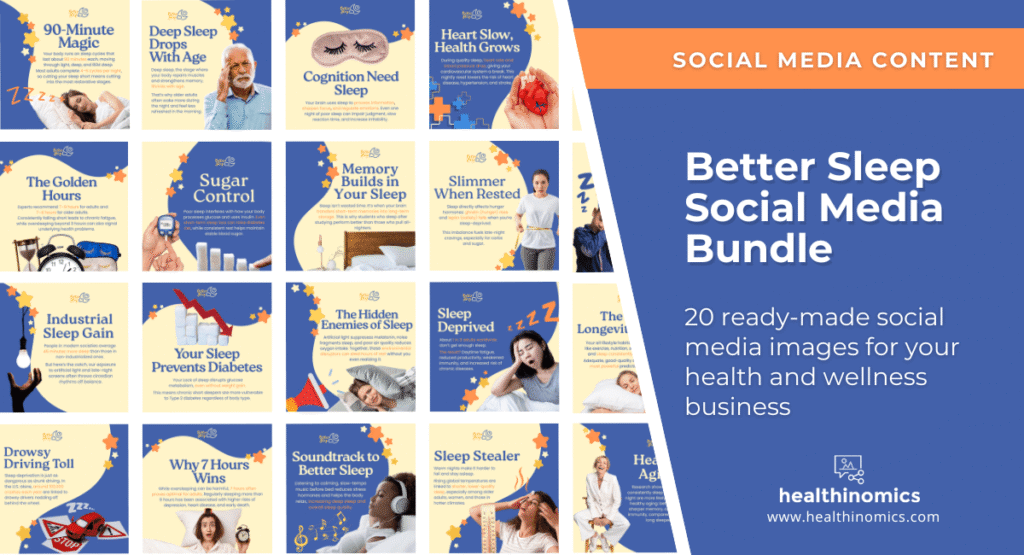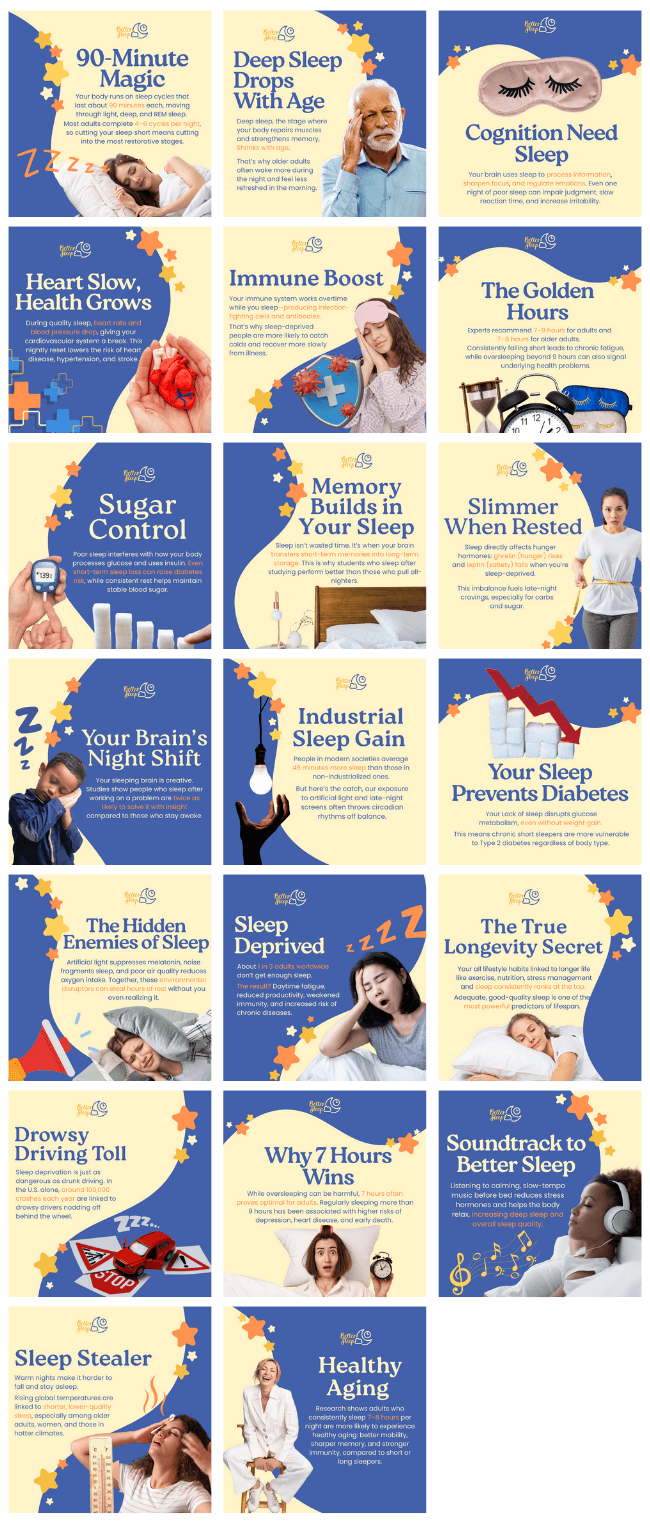Better sleep is the foundation of good health. It is more than just getting enough hours of rest because true quality sleep restores energy, sharpens focus, and regulates emotions, shaping how people think, act, and feel each day. Sharing educational posts about better sleep on social media makes these insights more accessible, giving followers practical tips they might not learn elsewhere. A simple reminder to limit caffeine before bed or to stick with a consistent sleep schedule can encourage meaningful changes. Over time, these small lessons build conversations, motivate healthier habits, and create an online community that values rest and balance rather than burnout. By bringing attention to sleep, content creators can inspire their followers to improve daily life one night of rest at a time.
Inside the Social Media Bundle
BONUS 20 sample captions for you to share with your bundle!
BONUS Editable Canva Template!
The Better Sleep Social Media bundle includes 20 beautiful pieces of visual content ready to share.

Social Media Image Content Ready To Share
1. 90-Minute Magic
Your body runs on sleep cycles that last about 90 minutes each, moving through light, deep, and REM sleep. Most adults complete 4–6 cycles per night, so cutting your sleep short means cutting into the most restorative stages.
2. Deep Sleep Drops with Age
Deep sleep, the stage where your body repairs muscles and strengthens memory, shrinks with age. That’s why older adults often wake more during the night and feel less refreshed in the morning.
3. Cognition Needs Sleep
Your brain uses sleep to process information, sharpen focus, and regulate emotions. Even one night of poor sleep can impair judgment, slow reaction time, and increase irritability.
4. Heart Slows, Health Grows
During quality sleep, heart rate and blood pressure drop, giving your cardiovascular system a break. This nightly reset lowers the risk of heart disease, hypertension, and stroke.
5. Immune Boost by Zzz’s
Your immune system works overtime while you sleep—producing infection-fighting cells and antibodies. That’s why sleep-deprived people are more likely to catch colds and recover more slowly from illness.
6. Memory Builds in Your Sleep
Sleep isn’t wasted time—it’s when your brain transfers short-term memories into long-term storage. This is why students who sleep after studying perform better than those who pull all-nighters.
7. Sugar Control by Slumber
Poor sleep interferes with how your body processes glucose and uses insulin. Even short-term sleep loss can raise diabetes risk, while consistent rest helps maintain stable blood sugar.
8. Slimmer When Rested
Sleep directly affects hunger hormones: ghrelin (hunger) rises and leptin (satiety) falls when you’re sleep-deprived. This imbalance fuels late-night cravings—especially for carbs and sugar.
9. Healthy Aging by Sleep
Research shows adults who consistently sleep 7–8 hours per night are more likely to experience healthy aging—better mobility, sharper memory, and stronger immunity—compared to short or long sleepers.
10. The Golden 7-9 Hours
Experts recommend 7–9 hours for adults and 7–8 hours for older adults. Consistently falling short leads to chronic fatigue, while oversleeping beyond 9 hours can also signal underlying health problems.
11. One-in-Three Sleep Deprived
About 1 in 3 adults worldwide don’t get enough sleep. The result? Daytime fatigue, reduced productivity, weakened immunity, and increased risk of chronic diseases.
12. Drowsy Driving Toll
Sleep deprivation is just as dangerous as drunk driving. In the U.S. alone, around 100,000 crashes each year are linked to drowsy drivers nodding off behind the wheel.
13. Industrial Sleep Gain
People in modern societies average 45 minutes more sleep than those in non-industrialized ones. But here’s the catch—our exposure to artificial light and late-night screens often throws circadian rhythms off balance.
14. Longevity’s #1 Habit
Of all lifestyle habits linked to longer life—exercise, nutrition, stress management—sleep consistently ranks at the top. Adequate, good-quality sleep is one of the most powerful predictors of lifespan.
15. Less Can Be More
While oversleeping can be harmful, 7 hours often proves optimal for adults. Regularly sleeping more than 9 hours has been associated with higher risks of depression, heart disease, and early death.
16. Sleep Prevents Diabetes
Lack of sleep disrupts glucose metabolism, even without weight gain. This means chronic short sleepers are more vulnerable to Type 2 diabetes regardless of body type.
17. Dreamtime Think-Tank
Your sleeping brain is creative. Studies show people who sleep after working on a problem are twice as likely to solve it with insight compared to those who stay awake.
18. Music = Better Zzzs
Listening to calming, slow-tempo music before bed reduces stress hormones and helps the body relax—increasing deep sleep and overall sleep quality.
19. Heat’s Sleep Stealer
Warm nights make it harder to fall and stay asleep. Rising global temperatures are linked to shorter, lower-quality sleep, especially among older adults, women, and those in hotter climates.
20. Lights, Noise, Air—Saboteurs
Artificial light suppresses melatonin, noise fragments sleep, and poor air quality reduces oxygen intake. Together, these environmental disruptors can steal hours of rest without you even realizing it.


